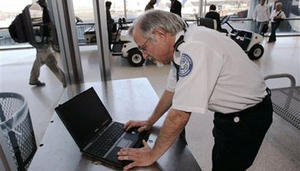New legal challenge to DHS laptop searches at U.S. border
The Obama administration has continued a Bush administration policy which permits officers at U.S. borders to detain travelers’ laptop computers and examine their contents even without suspecting the traveler of wrongdoing — or, in the language of DHS policy, “absent individualized suspicion”; in a federal lawsuit filed Tuesday in the Eastern District of New York, the plaintiffs allege that DHS policy of substituting “search at will” for “reasonable suspicion” violates constitutional rights to privacy and free speech

Laptop undergoing DHS search // Source: worldculturepictorial.com
U.S. Customs agents can now instruct you to log on to your laptop so they can read your e-mails and personal files and examine which Web sites you have visited. They can make a copy of your hard drive, and of any other storage device, so the government can comb through the contents more leisurely. The contents, without your knowledge, may be shared with any other government agencies, and it can be kept in perpetuity. The same applies to your BlackBerry, iPhone, and other digital devices. Customs agents can do all that, according to DHS policy, “absent individualized suspicion.”
Critics say the government’s substitution of “search at will” for “reasonable suspicion” is a flagrant violation of the Fourth Amendment. Criminal defense lawyers, press photographers, and a university student have joined to challenge the Obama administration’s search policy which permits officers at U.S. borders to detain travelers’ laptop computers and examine their contents even without suspecting the traveler of wrongdoing.
In a federal lawsuit filed Tuesday in the Eastern District of New York, the plaintiffs allege that DHS policy violates constitutional rights to privacy and free speech.
At issue is the government’s contention — upheld by two federal appeals courts — that its broad authority to protect the border extends to reviewing information stored in a traveler’s laptop, cellphone, or other electronic device, even if the traveler is not suspected of involvement in criminal activity. The government argues that a laptop is no different than a suitcase.
The Washington Post’s Ellen Nakashima writes that after the 9/11 terrorist attacks, the George W. Bush administration took an expansive view of the government’s authority at the border in an effort to stop terrorists from entering the country, and to find evidence of terrorist plots.
The Obama administration has followed suit, the plaintiffs said, with a pair of DHS policies issued by U.S. Customs and Border Protection (CBP) and U.S. Immigration and Customs Enforcement (ICE) in August 2009 that reaffirmed the policy of suspicionless searches at the border (see “‘Absent individualized suspicion’: DHS ‘search at will’ policy violates the Fourth Amendment,” 10 October 2009 HSNW; and “Laptops at border crossings may be searched without probable cause,” 28 August 2009 HSNW).
“Keeping Americans safe in an increasingly digital world depends on our ability to lawfully screen materials entering the United States,” DHS secretary Janet Napolitano said when the policies were issued. “The new directives … strike the balance between
